Add this eBook to your basket to receive access to all 297 records. Our indexes include entries for the spelling brownlow. In the period you have requested, we have the following 297 records (displaying 201 to 210): These sample scans are from the original record. You will get scans of the full pages or articles where the surname you searched for has been found. Your web browser may prevent the sample windows from opening; in this case please change your browser settings to allow pop-up windows from this site. Oxford Voters: Holywell
(1868)
The poll of the freemen and electors of the City of Oxford was taken 17 November 1868, the candidates being the Rt Hon Edward Cardwell (C), William Vernon Harcourt esq., Q.C. (H), and James Parker Deane, Esq., Q.C., D.C.L. (D). This poll book, published by the Oxford Chronicle, lists all the voters alphabetically by parish or township, freemen's names being preceded by an asterisk. Postal addresses are given, including street numbers, and in the case of freemen occupation is usually given. Lodgers are listed separately at the end of each section. The areas covered are: All Saints, St Aldate, Binsey, St Clement, Cowley, St Ebbe, St Giles, Headington, North Hincksey, South Hincksey, Holywell, Iffley, St John, St Martin, St Mary Magdalen, St Mary the Virgin, St Michael, St Peter in the East, St Peter le Bailey, and St Thomas; and there is also a list of Out of Town (non-resident) freemen who voted. | Sample scan, click to enlarge
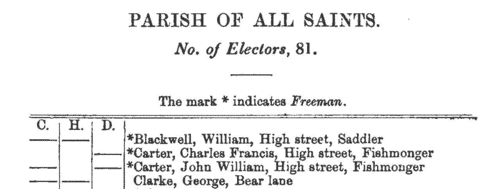
| Oxford Voters: St Thomas
(1868)
The poll of the freemen and electors of the City of Oxford was taken 17 November 1868, the candidates being the Rt Hon Edward Cardwell (C), William Vernon Harcourt esq., Q.C. (H), and James Parker Deane, Esq., Q.C., D.C.L. (D). This poll book, published by the Oxford Chronicle, lists all the voters alphabetically by parish or township, freemen's names being preceded by an asterisk. Postal addresses are given, including street numbers, and in the case of freemen occupation is usually given. Lodgers are listed separately at the end of each section. The areas covered are: All Saints, St Aldate, Binsey, St Clement, Cowley, St Ebbe, St Giles, Headington, North Hincksey, South Hincksey, Holywell, Iffley, St John, St Martin, St Mary Magdalen, St Mary the Virgin, St Michael, St Peter in the East, St Peter le Bailey, and St Thomas; and there is also a list of Out of Town (non-resident) freemen who voted. | Sample scan, click to enlarge
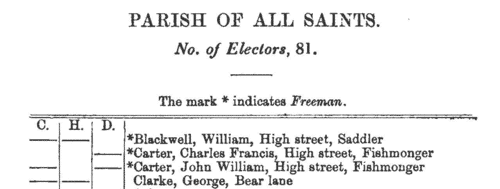
| Deaths
(1869)
Deaths reported in the Pall Mall Gazette, May 1869 | Sample scan, click to enlarge

| Boys entering Cheltenham College
(1874)
Cheltenham College 'was founded in order to provide for the sons of gentlemen a Classical, Mathematical, and General Education of the highest order, on moderate terms, in strict conformity with the principles and doctrines of the Church of England.'
Andrew Alexander Hunter, the college registrar, compiled the first edition of the College Register in four parts from 1883 to 1886: these merely listed the boys by term of entry, with their dates of birth and names and addresses of their fathers. Circulars were also sent out to all Old Cheltonians whose addresses were known, requesting additional details. On the basis of the returns from these and Hunter's further researches, this much fuller register was published in 1890.
The information after each boy's name is given (where known and applicable) in this format: father's full name and address as of the time the boy entered the college; class and department on entering the college (classes being number from 1 downwards, and these again divided into A and B, some into C and D, others into P (Principal's side) and V. P. (Vice-Principal's side) - 1A was the highest class in each department: besides this, certain others were called Addiscombe, Woolwich, Civil, Direct, Line, Sandhurst, Naval, Special, Preparatory, Latin, and India Civil) and the same on leaving, name of Boarding House (or 'Day Boy'), scholastic and athletic honours attained at the college, and subsequent career (including date and place of death, or present address in 1890, if known). | Sample scan, click to enlarge
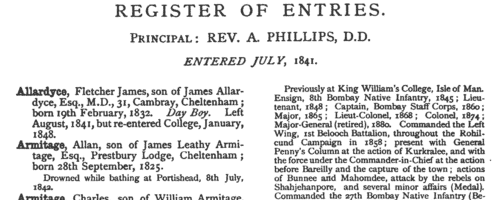
| Freeholders in county Carlow
(1873-1875)
Owners of an acre or more, whether resident there or elsewhere: with their addresses; the acreage; and a valuation of the land. The survey commenced in February 1873, the last returns being received in November 1875. | Sample scan, click to enlarge
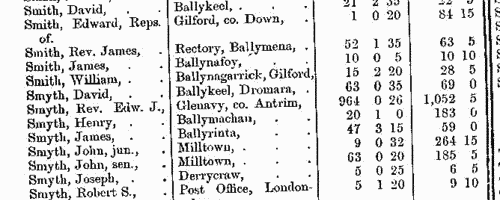
| Freeholders in county Monaghan
(1873-1875)
Owners of an acre or more, whether resident there or elsewhere: with their addresses; the acreage; and a valuation of the land. The survey commenced in February 1873, the last returns being received in November 1875. | Sample scan, click to enlarge

| Residents of Cork (1875)
Alphabetical directory of the city and suburbs of Cork from Francis Guy's county and city almanac
| Sample scan, click to enlarge

| Baptists
(1876)
The Baptist was a weekly newspaper, with some general news and political coverage, but mainly devoted to chronicling Denominational Intelligence, i. e. the doings of the Baptist churches in Britain and Ireland. January to June 1876. | Sample scan, click to enlarge
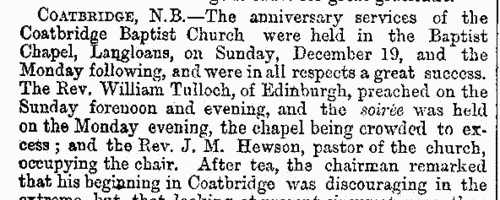
| Boys entering Cheltenham College
(1876)
Cheltenham College 'was founded in order to provide for the sons of gentlemen a Classical, Mathematical, and General Education of the highest order, on moderate terms, in strict conformity with the principles and doctrines of the Church of England.'
Andrew Alexander Hunter, the college registrar, compiled the first edition of the College Register in four parts from 1883 to 1886: these merely listed the boys by term of entry, with their dates of birth and names and addresses of their fathers. Circulars were also sent out to all Old Cheltonians whose addresses were known, requesting additional details. On the basis of the returns from these and Hunter's further researches, this much fuller register was published in 1890.
The information after each boy's name is given (where known and applicable) in this format: father's full name and address as of the time the boy entered the college; class and department on entering the college (classes being number from 1 downwards, and these again divided into A and B, some into C and D, others into P (Principal's side) and V. P. (Vice-Principal's side) - 1A was the highest class in each department: besides this, certain others were called Addiscombe, Woolwich, Civil, Direct, Line, Sandhurst, Naval, Special, Preparatory, Latin, and India Civil) and the same on leaving, name of Boarding House (or 'Day Boy'), scholastic and athletic honours attained at the college, and subsequent career (including date and place of death, or present address in 1890, if known). | Sample scan, click to enlarge
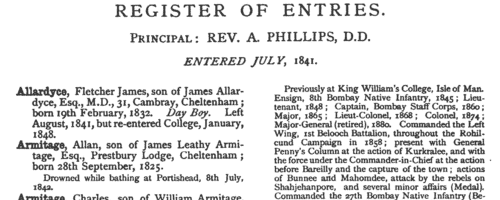
| Boys entering Wellington College in Berkshire
(1880)
Wellington College, near Wokingham, was originally founded for the education of sons of military officers. A register of boys entering the school from First Term 1859 to Michaelmas 1933 was compiled by F. G. Lawrence for the Old Wellingtonian Society. In each entry the boy's name is given in full, in bold, surname first; age at entry (usually 11 to 14); then, in brackets, the name of the dormitory or house to which he belonged, in italics, with the years of his stay; then his father's name (usually surname and initials, but not christian name) with military decorations where appropriate. School prefects and captains are noted as such; if the boy played cricket for the school, XI with the years; academic honours, scholarships, &c.; a brief biography; and date of death, or (where known) address in 1933. Year of marriage is given, and sometimes the wife's name and/or her father's name. Clearly, those boys who kept contact with the school and/or had distinguished military careers have detailed entries; others disappeared into oblivion on leaving. | Sample scan, click to enlarge
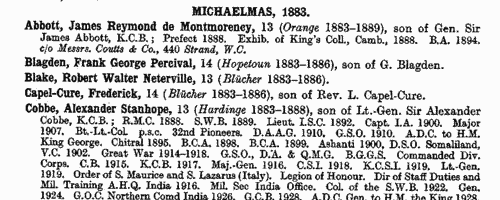
|
Research your ancestry, family history, genealogy and one-name study by direct access to original records and archives indexed by surname.
|











